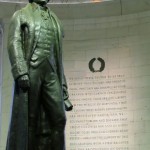By Kyle Roberts MODERN INTERPRETATIONS OF THE COMMERCE CLAUSE The major modern interpretations of the meaning behind the commerce clause come from two professors who wrote fifty eight and seventy four years ago, respectively. The first was Walton Hamilton who in 1937 wrote “The Power to Govern; The Constitution - Then and Now.” He … [Read more...]
Congressional Carte Blanche: Commerce Clause Pt. 1
By Kyle Roberts The Commerce Clause has morphed into a congressional carte blanche for “constitutional” legislation. As a result of improper constitutional interpretation and verbal legal maneuvering, the original understanding of the clause and its operation has been totally lost. I have written elsewhere that the proper source for … [Read more...]
Equality & the Declaration of Independence
By Kyle Roberts “All men are created equal” is perhaps the least understood and most abused phrase in American Independence literature. As with most other historical concepts - stripped of original context - it has come to be the philosophical authority for virtually every social doctrine, special interest persuasion, international … [Read more...]
The “Original Intent” Scam
By Kyle Roberts The former Alaska Attorney General John Havelock recently wrote: “The ‘Originalists’ of 2011 want to throw out much of what generations of judges have had to say, [about the Constitution] in favor of a new interpretation of what the draftsmen thought." "Originalists color themselves as conservatives, but this approach … [Read more...]
The Vital Shift From Issues to Forms
By Kyle Roberts You can never change things by fighting the present reality. Instead, change the model that has created it, and the reality will change automatically. Another way to say this is you can never change things by haggling over issues and their complex nature. Instead reexamine the form, or the structure, or the system that … [Read more...]
Overcoming the Agency Costs of Representative Government, Part 2
By Kyle Roberts This is Part 2 of a two-part series. Read Part 1 here. The Power of the States Large-scale republics do not allow the people to effectively monitor their elected officials. The more people there are, the more issues follow. When issues increase it is harder for the people to create a stable majority to fight special … [Read more...]
Overcoming the Agency Costs of Representative Government, Part 1
By Kyle Roberts One of the disadvantages of a republic is agency costs. The smaller the ratio between the people and their elected officials the more secure are the rights of the people. Conversely, the larger the ratio between the people and their elected officials the less secure are the rights of the people. This ratio and its … [Read more...]
Allodial Rights & the Unalienable Right to Property
By Kyle Roberts Jefferson’s original draft of the Declaration of Independence read “life, liberty, and property.” However, property was edited out at the suggestion of Ben Franklin because of its implications towards slavery. The pursuit of happiness replaced it and has become the commonplace recitation. This unfortunate expediency edit … [Read more...]
Unalienable Rights: They Have Nothing to Do With Aliens
By Kyle Roberts In my constitution classes I always ask the participants to define a "right.” The catch is they have to do it without using the word “right.” In my experience, whenever people are talking about rights, it is always in the context of a right to something: a right to life, to bear arms, to liberty, to property, to freely … [Read more...]
Breaking Free of the Two-Party System, Part 2: Solutions
By Kyle Roberts This is part two of a two-part series. Read Part 1 here. There are two fundamental reasons why this system has so much power: The parties are intimately connected with government operation of elections—from filling vacancies, to making appointments, to placing candidates on the ballot, and controlling the choices … [Read more...]















